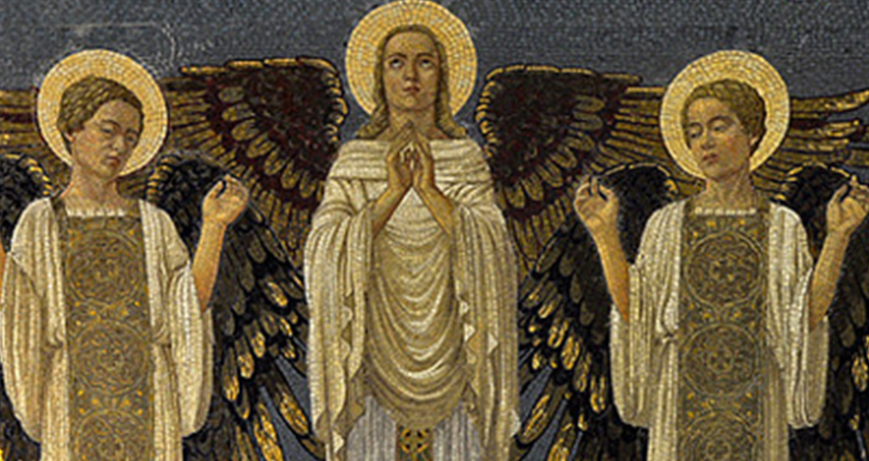
Fidelity
Just as Our Lord Jesus Christ hiFidelity is the oldest distinguishing mark of the holy Angels, who remained faithful in the trial at the beginning of time. That is why it is the deepest foundation of the members of the Opus Angelorum.
Our fidelity is to God and the Holy Catholic Church, to the Holy Father, the bishops and priests, to our baptismal vows and our commitments. It requires self-discipline so as to avoid any disparaging criticism in thoughts and even more in words (cf. Mt 7:1-5). In fidelity are to be found fortitude and faith; fidelity's reward is the Kingdom of God: "Be faithful unto death, and I will give you the crown of life" (Apoc 2:10; cf. Mt 25:21-23).
Humility
Humility arises from the adoring knowledge of GOD (cf. CCC 2628) and bears within itself childlike, unshakeable trust in God. It should be a cheerful courage to serve, an "Adsum" ("Here I am-I am ready!") even in trials and seeming injustices. Humility, with the grace of God, combats and overcomes distrust, jealousy and envy; it fights against susceptibility and ressentments, against the attitude of knowing and thinking oneself better, and it protects against coldness of heart. It rests on the words of the Lord: "Whoever exalts himself will be humbled, and whoever humbles himself will be exalted." (Mt 23:12; Lk 14:11; 18:14)
Humility is always accompanied by the readiness to help and by cheerfulness, by fortitude and trust. Trust must come from a pure heart and a childlike simple and uncomplicated disposition.
Obedience
Obedience must be grounded in the Holy Spirit; our model is the winged obedience of the holy Angels (cf. Ps 103:20; Hb 1:7). They help us to obey out of love, without revolting or procrastinating. They teach us: holy obedience begins only there, where human insight ends. Then the grace of obedience will ally itself with the grace of humility and bring it about that an order works out for the good. Obedience aims for the bond of unity in community and bundled strength in the mission. Wisdom and simplicity lie within it.
Love
Before all else, love should grow, in which lies holy surrender, love for God, for the Most Holy Eucharist, for the Cross and for Mary. Our entire life and everything we do should be guided by an ardent love for God. Starting with the thoughts, love should always be at the center like the heart, yes, in each and every word and deed. Therefore, the love of the Eucharistic Lord and the love of the Mother beneath the Cross is our frequent meditation, for instance after Holy Communion.
Love should be the mainspring of all our actions. He who loves GOD with all his heart will, proceeding from the Divine 'You', find the cordial contact with the human 'you'. Only the one who loves with all his heart can live love: understanding and kindness, cheerfulness and meekness, readiness for every sacrifice and the fortitude of love, which bears and overcomes all things (cf. 1 Cor 13:4-7).
Silence
Under the watchful guidance of the holy Angels we learn silence, benevolent silence which comes from interior calm and wishless union with God. The journey passes through detachment from all ballast of unnecessary habits and bonds so that the soul becomes free for being in God. Interior silence makes the soul sensitive to the voice of the Lord and receptive to the riches of His grace and love.
Measure
Our time tends to intemperance. Temperance begins with the order of one's own inner life. We learn to bridle our thoughts and not allow them to wander away into angry or derogatory criticism or into daydreams. We learn to weigh our words and to keep clear of uncharitableness as well as thoughtlessness. Neither sympathy nor antipathy should guide our deeds but rather the supernatural love of GOD and neighbor. Temperance is the basis for purity and tranquility, for clarity and sanctity.
Imitation of Mary
Mary is the Queen of the Angels and our Mother. She takes us as her "children" to her heart, and we entrust our needs to her. In the many challenges of our daily life, Mary admonishes us to interior calm, to dispel oppressing thoughts. In her "Fiat mihi" she is the model, the one who untangles the knots of difficulties, the one who opens the door for an intimate dialogue with God. By imitating Mary and becoming increasingly Marian, we find our way more and more into the footsteps of the Lord and His discipleship.